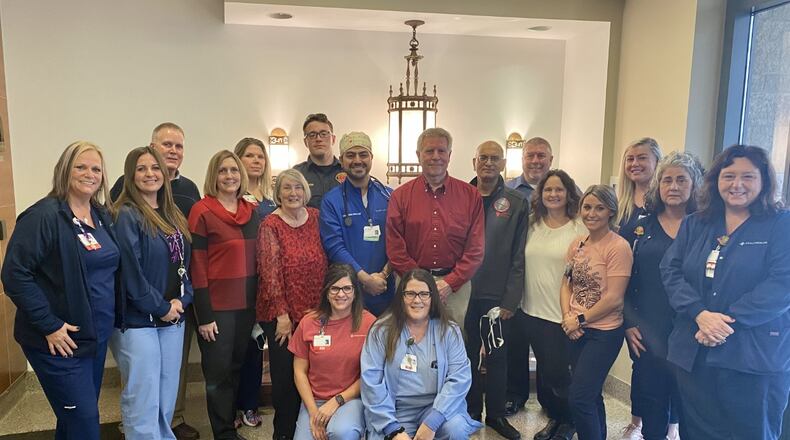His wife, Paulette, called for emergency services. On the way to the hospital, Brumfield had a heart attack in the ambulance.
Brumfield, who underwent a triple bypass surgery as a result of the attack, has faint memories of the experience . He did prevent a hospital employee from cutting up his favorite golf shirt during a moment of consciousness, though. After that, he hazily remembers being wheeled down a hallway to the operating room.
Springfield Regional Medical Center sees roughly 300 patients per year who receive a heart attack diagnosis, and the area’s hospital is working to raise awareness of heart attack prevention and recovery through its Segment Elevation Myocardial Infarction (STEMI) programming.
Shella Baker-Trego, who started her role as the chest pain pathway clinical coordinator at Mercy Health’s Springfield Regional Medical Center in August, said that the hospital is looking to ramp up efforts to educate the community and EMS workers about heart health through a social media campaign. It will include resources about fitness, smoking cessation and stress management.
The program also focuses on emergency service workers by keeping them up to date on how their heart attack patients have recovered and awarding them for their efforts.
Blood pressure and cholesterol screenings will be offered to the community in the coming months as a part of the programming, Baker-Trego said.
Heart disease remains the leading cause of death worldwide, according to the American Heart Association, and the effects of COVID-19 are likely to influence cardiovascular health and mortality rates for many years as a result of increased lifestyle-related risks during and after the pandemic.
The chest pain coordinator said that the pandemic impacted the public’s access to certain health services, and the hospital has witnessed a “surge” in emergent patients who may have fallen behind on screenings and other services related to heart health.
“The ERs in the entire region are bursting at the seams,” she said.
Cardiology services maintained availability of services throughout the pandemic, according to Mercy Health in an email, but the hospital did have to pause its cardiac rehabilitation services with the shut down of elective services.
Brumfield couldn’t access the cardiac rehabilitation services immediately following his heart attack, so he began his recovery at home by going for short walks.
The avid golfer and longtime “honey-do master” of his household doesn’t like to sit still, but the weeks following the end of his hospitalization proved to be challenging.
“I was a very active person,” he said. “I was getting out of breath by the time I got to the top of the street.”
Once he was able to begin cardiac rehabilitation through Mercy Health, he attended sessions for roughly a month.
Baker-Trego said that another portion of Mercy Health’s heart care program will focus on educating people on the signs of heart attack.
“For some people, that can really be the difference between life and death,” Baker-Trego said.
According to the American Heart Association, heart attack signs include the following:
- Chest pain or discomfort: Most heart attacks involve discomfort in the center of the chest that lasts more than a few minutes – sometimes it goes away then returns. This can feel like an uncomfortable amount of pressure, squeezing, fullness or pain.
- Discomfort in other areas of the upper body: Symptoms can include pain in one or both arms, the back, neck, jaw or even the stomach.
- Shortness of breath: This may accompany chest discomfort.
- Other possible signs: breaking out in a cold sweat, nausea and/or lightheadedness.
Baker-Trego said that if a person feels symptoms of this nature, it’s crucial to call 911. Although 50% of patients the regional medical sees are walk-ins, calling for emergency services is advantageous, as a call allots more time to emergency personnel to prepare for their arrival, she said.
“Time, in this arena, is muscle,” she said. “The longer someone stays with symptoms, the longer the arteries close, the more heart muscle they lose, and many times, they do not get it back. It’s debilitating for the rest of their lives.”
Brumfield and his wifesaid that in terms of heart attack recovery, following through with breathing exercises is important, as well as maintaining physical fitness.
Brumfield will be the main speaker of Mercy Health’s heart recognition dinner, which is slated for February in recognition of American Heart Month.
“The whole process of what I went through, from the emergency room to the day I was released, it was like, ‘Thank goodness I was here,’” he said.
About the Author

